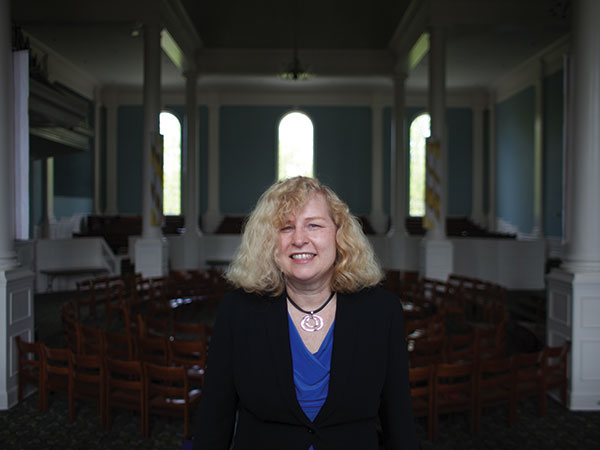The “Inside the PTS Curriculum” series gives you an inside look at what students are learning in their courses at Pittsburgh Theological Seminary. Each article focuses on one class, its subject matter, what students can expect to learn, the required texts, and the kinds of assignments students can expect. We’ll let you know whether the course is required or available for the Master of Divinity (MDiv), the Master of Arts in Pastoral Studies (MAPS), or Master of Theological Studies (MTS). Each article will include the professors’ bio.
This week’s course is: “Preaching and Communication in Ministry.”
About Preaching and Communication in Ministry
Earlier this year, Pittsburgh Theological Seminary students learned about the theology and practice of preaching with the Rev. Drs. Angela Hancock and L. Roger Owens in the class “Preaching and Communication in Ministry.” This course is required for students in the Master of Divinity (MDiv) degree program and is open to students in the Master of Arts in Pastoral Studies (MAPS) degree or Master of Theology (MTS) degree program.
In this course, students were introduced to the theology and practice of preaching, with attention to the performative skills involved in effective communication in ministry settings. Topics included: the oral interpretation of Scripture, biblical exegesis for proclamation, the role of culture and context in preaching, the structure and rhetoric of sermons, and the non-verbal dimensions of communication.
Upon completion of this course, students were able to identify their gifts for and calling to the task of Christian proclamation; define and describe the theological and methodological issues at stake in the movement from a biblical text to a sermon in relation to a particular congregational context; and give evidence of growth in the exegetical, rhetorical, creative, pastoral, and performative skills involved in the practice of preaching and communication in ministry. Further, students were able to demonstrate working knowledge of the basic exegetical method and approaches to sermon design introduced in class through the creation and delivery of two sermons. Students exhibited the capacity to think critically and deeply about their own practice and listened with discernment to the sermons of others, using the theological and rhetorical language of homiletical criticism.
Assignments included speech performative exercises and class participation, two sermons (written and preached), regular analysis of selected sermons, a midterm take-home assessment, and a brief ethnography of context for the second sermon. Students read Ways of the Word: Learning to Preach for Your Time and Place by Sally Brown and Luke Powery; Wondrous Depths: Preaching the Old Testament, by Ellen Davis; The Witness of Preaching by Thomas Long; and Getting the Word Across: Speech Communication for Pastors and Lay Leaders by G. Robert Jacks.
About the Instructors
The Rev. Dr. Angela Dienhart Hancock serves as associate professor of homiletics and worship. She is an ordained Minister of Word and Sacrament in the Presbyterian Church (U.S.A.) and has served as pastor to churches in Pennsylvania, Kentucky, and Tennessee. Hancock is the author of Karl Barth’s Emergency Homiletic, 1932-33: A Summons to Prophetic Witness at the Dawn of the Third Reich, a contextual interpretation of Swiss theologian Karl Barth’s lectures on preaching in the early 1930s, based on unpublished archival material. Her current research explores Karl Barth’s contribution to the ethics of deliberation in Christian communities and the relationship between political and theological rhetoric. Hancock continues to preach, teach, and lead worship in a variety of settings.
The Rev. Dr. L. Roger Owens received his Ph.D. in theology from Duke University where he was awarded a Lilly Fellowship for the Formation of a Learned Clergy. Before that he completed his M.Div. at Duke Divinity School. As an undergraduate he studied philosophy and Bible/religion at Anderson University in Indiana. Owens is an ordained Elder in the North Carolina Annual Conference of the United Methodist Church. In North Carolina he served both urban and rural churches for eight years as co-pastor with his wife before coming to PTS. His newest book is Threshold of Discovery: A Field Guide to Spirituality in Midlife (Church Publishing, 2019). Owens serves on the faculty for the Upper Room’s Academy for Spiritual Formation, where he lectures on postmodern spirituality and traditions of Christian spirituality.

